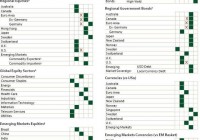Chart Of The Week – 2008 Or 2011?
By Joseph Y. Calhoun Credit spreads are a big input to our investment process. It was the widening of spreads that convinced us to reduce our equity allocation before the volatility of last year. But active asset allocation requires that you get two consecutive decisions correct and that isn’t an easy task. Right now, for instance, we are watching spreads intently trying to figure out whether the all clear has been sounded. Spreads have narrowed considerably over the last five weeks, and if they continue to do so, we will, in keeping with our process, be forced to raise our risk budget. When we did our monthly Global Asset Allocation review 11 days ago, the trend was still toward widening and the decision was obvious but spreads have continued to narrow. So, the big question facing us and all the other tactical allocators is this: Is it 2008 or 2011? If it’s the former, we have just been given a wonderful opportunity to get more defensive. If it is the latter, we need to figure out how to raise our risk allocation. Click to enlarge So which is it?
